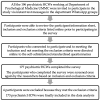Prevalence of Anxiety and Depression among Psychiatric Healthcare Workers during the COVID-19 Pandemic: A Malaysian Perspective
- PMID: 35327009
- PMCID: PMC8951112
- DOI: 10.3390/healthcare10030532
Prevalence of Anxiety and Depression among Psychiatric Healthcare Workers during the COVID-19 Pandemic: A Malaysian Perspective
Abstract
The psychological distress reported among frontline healthcare workers (HCWs) is concerning. Little is known about the mental health of non-frontline, psychiatric HCWs, who play a central role in handling the mental health crisis during the COVID-19 pandemic. This study aimed to examine the prevalence of anxiety and depression among psychiatric HCWs and evaluate its association with socio-demographic, socio-economic, work-related factors and coping strategies. The authors proposed a cross-sectional study design using the Hospital Anxiety and Depressive Scale (HADS) and Brief-COPE scale. This study found that the prevalence of anxiety and depression were 22.0% and 16.8%, respectively. A multivariate analysis revealed that married psychiatric HCWs had a lower level of anxiety with OR = 0.31 (95% CI: 0.11-0.83). Psychiatric HCWs who were experiencing financial hardships, were unvaccinated and those who had a shorter duration of service in the psychiatric department had a higher level of depressive symptoms with OR = 0.31 (CI: 1.19-11.27), 3.21 (CI: 0.97-10.52), and 1.01 (CI: 1.00-1.02), respectively. For every increase of one unit of avoidant coping score among respondents, the odds of having anxiety and depression increased by 1.25 times (CI: 1.15-1.37) and 1.20 times (CI: 1.09-1.32), respectively, whereas for every increase of one unit of religious coping score among respondents, the odds of having anxiety reduced by 1.42 times (CI: 1.10-1.84). The authors highlight that psychosocial measures addressing the relatively high levels of anxiety and depression among psychiatric HCWs should be a key priority to ensure the sustainment of mental health services in the face of this prolonged pandemic.
Keywords: COVID-19; Malaysia; anxiety; coping; depression; healthcare workers; mental health; non-frontline; psychiatry.
Conflict of interest statement
The authors declare no conflict of interest.
Figures
Similar articles
-
Religious Coping, Depression and Anxiety among Healthcare Workers during the COVID-19 Pandemic: A Malaysian Perspective.Healthcare (Basel). 2021 Jan 15;9(1):79. doi: 10.3390/healthcare9010079. Healthcare (Basel). 2021. PMID: 33467744 Free PMC article.
-
Burnout and Associated Factors Among Health Care Workers in Singapore During the COVID-19 Pandemic.J Am Med Dir Assoc. 2020 Dec;21(12):1751-1758.e5. doi: 10.1016/j.jamda.2020.09.035. Epub 2020 Oct 5. J Am Med Dir Assoc. 2020. PMID: 33256955 Free PMC article.
-
Factors Associated With Psychological Outcomes Among Vaccinated and Unvaccinated Health Care Workers Against COVID-19 Infection in Bangladesh.Front Med (Lausanne). 2022 Mar 24;9:852922. doi: 10.3389/fmed.2022.852922. eCollection 2022. Front Med (Lausanne). 2022. PMID: 35402432 Free PMC article.
-
Effects of COVID-19 pandemic on mental health among frontline healthcare workers: A systematic review and meta-analysis.Front Psychol. 2023 Jan 27;13:1096857. doi: 10.3389/fpsyg.2022.1096857. eCollection 2022. Front Psychol. 2023. PMID: 36778177 Free PMC article.
-
The psychological impact, risk factors and coping strategies to COVID-19 pandemic on healthcare workers in the sub-Saharan Africa: a narrative review of existing literature.BMC Psychol. 2022 Dec 1;10(1):284. doi: 10.1186/s40359-022-00998-z. BMC Psychol. 2022. PMID: 36457038 Free PMC article. Review.
Cited by
-
Turning to Religion During COVID-19 (Part II): A Systematic Review, Meta-analysis and Meta-regression of Studies on the Relationship between Religious Coping and Mental Health throughout COVID-19.J Relig Health. 2023 Feb;62(1):544-584. doi: 10.1007/s10943-022-01720-4. Epub 2023 Jan 3. J Relig Health. 2023. PMID: 36595190 Free PMC article.
-
Anxiety Levels and Coping Strategies to Deal with COVID-19: A Cross-Cultural Study among the Spanish and Latin American Healthcare Populations.Healthcare (Basel). 2023 Mar 13;11(6):844. doi: 10.3390/healthcare11060844. Healthcare (Basel). 2023. PMID: 36981500 Free PMC article.
-
Anxiety among hospitalized COVID-19 patients: a case-control study from a tertiary teaching hospital in Malaysia.Front Psychiatry. 2023 May 18;14:1148019. doi: 10.3389/fpsyt.2023.1148019. eCollection 2023. Front Psychiatry. 2023. PMID: 37275980 Free PMC article.
-
Examining the effects of anxiety and education level on mental health: The role of spiritual intelligence as an intervening variable in post COVID-19 patients in Indonesia.F1000Res. 2025 Feb 18;13:916. doi: 10.12688/f1000research.154599.4. eCollection 2024. F1000Res. 2025. PMID: 39959438 Free PMC article.
-
Resilience and Depressive Symptoms Mediated Pathways from Social Support to Suicidal Ideation Among Undergraduates During the COVID-19 Campus Lockdown in China.Psychol Res Behav Manag. 2022 Aug 23;15:2291-2301. doi: 10.2147/PRBM.S377158. eCollection 2022. Psychol Res Behav Manag. 2022. PMID: 36039109 Free PMC article.
References
-
- World Health Organization WHO Coronavirus (COVID-19) Dashboard. [(accessed on 4 October 2021)]. Available online: https://covid19.who.int.
-
- Ministry of Health Malaysia Covid-19 (Maklumat Terkini) [(accessed on 4 October 2021)]; Available online: http://www.moh.gov.my/index.php/pages/view/2019-ncov-wuhan.
LinkOut - more resources
Full Text Sources


